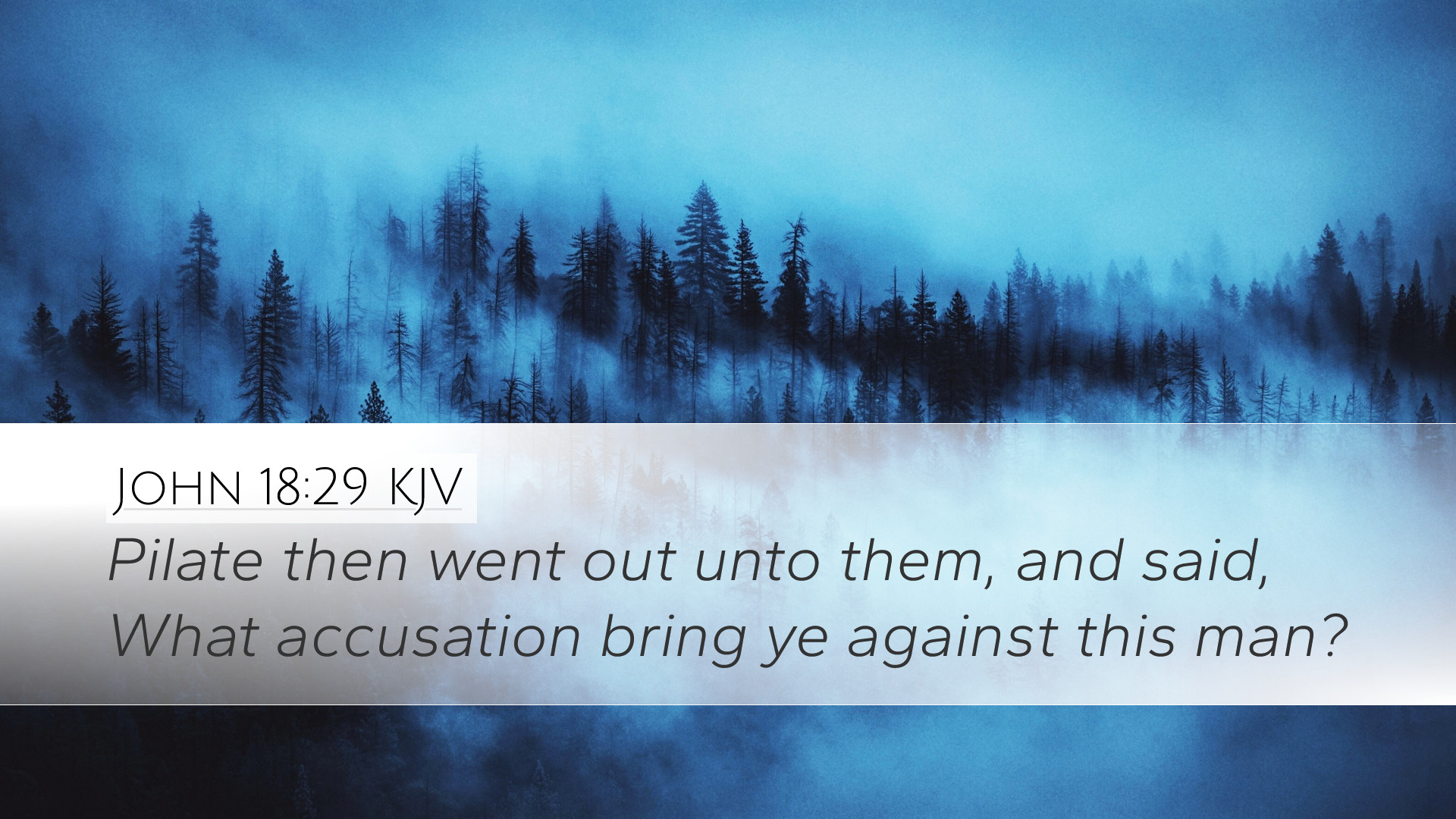Commentary on John 18:29
Verse: John 18:29 - "Pilate then went out unto them, and said, What accusation bring ye against this man?"
Contextual Overview
The events surrounding John 18:29 take place during the trial of Jesus before Pontius Pilate. Following His arrest, Jesus is brought before the Jewish authorities, who present Him to Pilate, the Roman governor. This moment is pivotal in the narrative, as it signifies the transition of Jesus' trial from Jewish to Roman jurisdiction.
Commentary Insights
1. Pilate's Role and Dilemma
According to Matthew Henry, Pilate represents a moral conflict, caught between the political pressures from the Jewish leaders and the societal implications of condemning an innocent man. His inquiry, “What accusation bring ye against this man?” indicates not only his procedural duty but also his instinctive curiosity regarding the validity of the charges brought against Jesus.
2. Lack of Clarity in Accusations
Albert Barnes emphasizes the ambiguous nature of the accusations against Jesus. The Jewish leaders had motives driven by jealousy and fear of losing their authority. Their interactions with Pilate reflect a calculated effort to manipulate Roman law in their favor, thereby illustrating the depths of their opposition against Jesus, whom they viewed as a threat to their power.
3. Theological Significance
This moment is steeped in theological meaning. Adam Clarke notes that the question posed by Pilate can be seen as a foreshadowing of the trial of humanity itself, as it reflects the broader spiritual inquiry: "What do you make of Jesus?" The preparedness of the leaders to answer Pilate suggests a broader rejection of Christ that resonates through the ages, compelling believers to confront their own understanding of Christ’s identity.
The Jewish Leaders' Accusations
The fact that they brought Jesus to Pilate without clear charges showcases their desperation and moral corruption. According to Matthew Henry, the Jewish authority's accusations were motivated by their desire to uphold their religious customs, which they felt Jesus threatened. This highlights how personal and political contexts can distort justice.
Manipulation of Justice
- Responsibility of Leaders: Pilate finds himself in a precarious position, where he acts as the arbiter of justice yet is aware of the illegitimacy of the charges against Jesus.
- The Role of the People: The people’s demand for Barabbas, instead of Christ, later in the narrative serves to underline the fickleness of public opinion.
Responses to Authority
In this text, Pilate’s engagement with the Jewish leaders also serves as a reminder for believers regarding their conduct in the face of authority. Albert Barnes writes about how a Christian should respond to the civil government. Without compromising their beliefs, they should represent truth firmly yet graciously. This incident urges modern-day believers to maintain their stand in society, even when faced with pressure.
Applying the Passage
For pastors and scholars, John 18:29 is an invitation to explore themes of justice, authority, and the identity of Christ. It challenges leaders to examine the integrity of their own judgments and the values upheld within their communities.
Key Applications:
- Evaluation of Accusations: Like Pilate, individuals must discern the truth from baseless accusations and cultivate a commitment to justice.
- Defending the Innocent: The passage prompts a reflection on how the Church stands with those who are wrongfully accused and oppressed.
- The Challenge of Authority: Believers are summoned to evaluate where their allegiance truly lies – with society’s expectations or with Christ’s teachings.
Conclusion
John 18:29 encapsulates a moment of profound significance where truth and authority collide. The unresolved tension between Jesus' innocence and the fervent determination of the Jewish leaders to condemn Him serves as an urgent call for self-examination within the church today. In summary, this passage not only narrates historical events but also calls believers into deeper reflection on their own stance toward Jesus and the surrounding society, making it a timeless exhortation for all followers of Christ.


